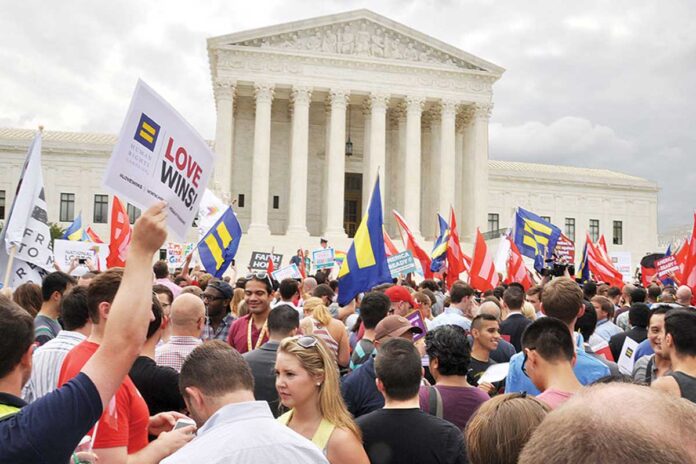In the first sentence of the Supreme Court’s 2015 opinion that granted nationwide same-sex marriage equality, Justice Anthony Kennedy wrote: “The Constitution promises liberty to all within its reach, a liberty that includes certain specific rights that allow persons, within a lawful realm, to define and express their identity.”
Five years later, those words and the majority ruling in Obergefell v. Hodges have given millions of LGBTQ Americans hope in themselves, in their relationships, and in the continuing quest for LGBTQ civil rights.
President Obama, who spoke in the Rose Garden the day the Court released its decision, commemorated the anniversary and the man at the center of it, Jim Obergefell. Obergefell’s and five other cases involving same-sex marriage were consolidated and brought before the Court in Obergefell v. Hodges.
“Jim’s courage and persistence helped change America for the better. And so did every American who marched, organized, stood up, came out—or changed their own heart because they love someone who did. Happy anniversary, everybody.”
According to a Gallup poll, one in ten LGBTQ Americans — around a million people — are married to a same-sex partner. Roughly 4.5 percent of the total population identifies as LGBTQ: approximately 10 million adults.
In the Obergefell decision, the Supreme Court ruled 5-4, with Justice Kennedy joining the Court’s four liberal justices to cast the deciding vote.
Mayor Pete Buttiegieg, who married his husband Chasten in 2018, wrote on Twitter about the closeness of the decision. “Five years ago today, by the grace of a single vote on the Supreme Court, the freedom to marry became real for millions of us. This is why government matters: it shapes our lives, and it is personal.”
Support for same-sex marriage has doubled in the last two decades, rising from 35 percent in 1999 to 67 percent in 2020. But there is still a sharp partisan divide, with 75 percent of Democrats saying they favor same-sex marriage compared with 44 percent of Republicans. And support among white evangelical protestants, although increasing in recent years, is even lower at 29 percent.
While the legal aspects of marriage — including hospital visitation rights and inheritance issues — have often been front and center in related Supreme Court cases, the majority of LGBTQ Americans say the most important reason to get married is for love.
When asked the question “Why get married?” by the Pew Research Center, 84 percent of LGBTQ people listed love as a very important reason. Having companionship and making a lifelong commitment were also listed as important reasons. Less than half of people polled said legal rights and benefits were an important reason to get married, and one-third said financial stability was also an important factor.
Former PGN editor Jen Colletta married her wife Ashlee in 2015. The two had been together for eight years before their wedding, but still found the experience to be life-changing.
“Having that validation of being legally married really showed us how serious we were about spending forever together,” Colletta told PGN. When the two women were planning their wedding, they wanted it “to feel equal and no different than these other family weddings, even though it was the first LGBTQ wedding for most of our guests.”
The U.S. is among 29 countries around the world to allow same-sex marriage. In 2000, the Netherlands became the first country to recognize marriage equality. Twenty years later, Costa Rica became the latest country. The vast majority of countries that have marriage equality are in the Americas and Europe. South Africa, Australia, New Zealand, and Taiwan allow same-sex marriage, but most other countries in the Middle East, Africa, and Asia do not recognize it, with many having laws that criminalize same-sex relationships.
As far as which country will be next to recognize marriage equality, the Human Rights Campaign has released a list of five “places to watch” for developments: Chile, the Czech Republic, Switzerland, the Philippines, and Thailand.

